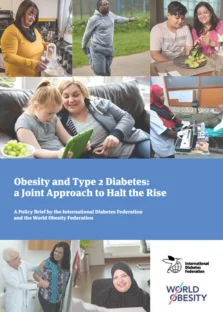IDF and the World Obesity Federation (WOF) have launched a new policy brief – Obesity and type 2 diabetes: a joint approach to halt the rise – focused on joint action to address the obesity and type 2 diabetes pandemics.
Non-communicable diseases (NCDs) are estimated to cause 41 million deaths annually, of which 15 million are premature. In 2013, Member States adopted a set of voluntary targets to help reduce the impact of NCDs by 2025 – including one target to halt the rise of obesity and diabetes.
This target of a zero increase in obesity and diabetes prevalence is catastrophically off-track and will not be met. World Obesity’s Missing the Target report shines a spotlight on the rise in obesity levels around the world and the IDF Diabetes Atlas 10th edition reports a continued global increase in the prevalence of type 2 diabetes, which accounts for around 90% of all diabetes. Current projections predict that by 2030, 1 billion people will be living with obesity and 642 million will be living with diabetes across the world.
We will only be able to halt the rise of type 2 diabetes if action on obesity is also prioritised.
Obesity is responsible for around 43% of all type 2 diabetes, rising to 80-85% in some populations. Many of the determinants of obesity and type 2 diabetes lie outside the traditional confines of the health sector. Therefore, their impact can only be reduced through multisectoral approaches.
The new IDF-WOF policy brief – Obesity and type 2 diabetes: a joint approach to halt the rise – provides diabetes and obesity advocates, healthcare professionals and policymakers with recommendations on the actions required to prevent, manage and treat both conditions effectively. It specifically:
- Generates knowledge about the root causes of obesity and recognises that it is a risk factor for type 2 diabetes and other health conditions, requiring urgent action in the short- and long-term.
- Highlights the importance of adopting a system-wide approach if we are to successfully halt the rising incidence and prevalence of diet-related NCDs.
- Advocates for people-centred care and ensuring that people living with obesity, type 2 diabetes and other NCDs are included in the development and evaluation of interventions and guidelines.
The policy brief will be launched today during an online event organised by IDF and WOF, involving representatives from the World Health Organization and governments, academics and people living with obesity and/or type 2 diabetes.
Download the policy brief below.




